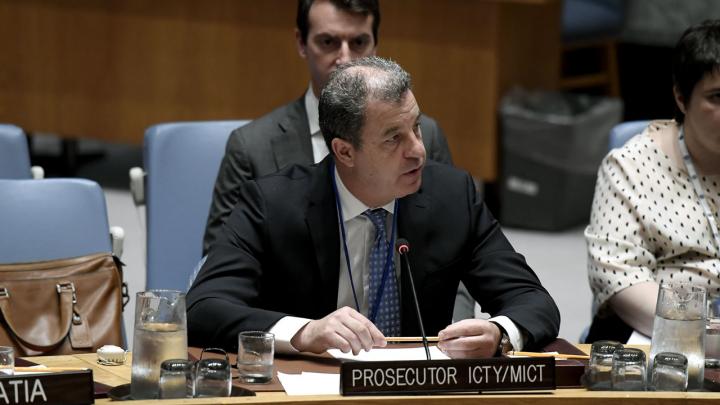Prosecutor Serge Brammertz addresses the United Nations Security Council

Prosecutor Serge Brammertz of the International Criminal Tribunal for the former Yugoslavia (ICTY) and the Mechanism for International Criminal Tribunals (MICT) today addressed the United Nations Security Council (UNSC).
The Prosecutor began his address by reporting that the trial judgment in the Mladić case and the appeal judgment in the Prlić et al. case are both expected by the end of November 2017, while trial proceedings in the Stanišić and Simatović case are expected to commence next week. The Prosecutor also updated the UNSC on the status of other proceedings before the MICT, including the filing of appeal submissions in the Karadžić and Šešelj appeals.
Turning to the search for the remaining eight fugitives indicted by the ICTR, the Prosecutor updated the UNSC on the efforts by the Office of the Prosecutor (OTP) to locate and arrest these fugitives. He said, “I would like to underscore our commitment to arresting and bringing these fugitives to justice. The victims of the Rwandan genocide deserve nothing less.”
Prosecutor Brammertz further updated the UNSC on the OTP’s efforts to support national prosecutions of war crimes in Rwanda and the countries of the former Yugoslavia. The OTP, together with the Prosecutor General of Rwanda, recently conducted a five-day capacity building program for prosecutors from Rwanda and other East African countries on the investigation and prosecution of war crimes. In addition, the OTP will later this month launch the translation of its publication on the prosecution of conflict-related sexual violence at the ICTY into the Bosnian-Croatian-Serbian language.
With respect to national prosecutions of war crimes in the former Yugoslavia, the Prosecutor stated, “I have previously reported that regional judicial cooperation in war crimes justice in the former Yugoslavia is heading in the wrong direction, and that is still the case today.”
Finally, Prosecutor Brammertz expressed the OTP’s alarm at the ongoing, widespread denial of crimes and refusal to accept facts established by the ICTY and ICTR. The Prosecutor remarked, “The message of denial and revisionism is loud and clear. We recognize our victims, but not yours. Your war criminals are our heroes.”
The Prosecutor called for urgent attention to this challenge. He stated, “When irresponsible officials use division, discrimination and hate to secure power, conflict and atrocities can gain a logic of their own. That was true two decades ago when the genocide and ethnic cleansing began, and it remains true today. With the closure of the ICTR, and the upcoming closure of the ICTY, it is now more important than ever to address this challenge. To secure a peaceful future, there must be a shared agreement on the recent past.”
The Prosecutor concluded, “The ICTY will before the end of the year complete its mandate. This will close an important chapter that the Council began twenty-four years ago. Yet the work of justice for the victims of war crimes in the former Yugoslavia and Rwanda will continue.”